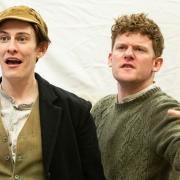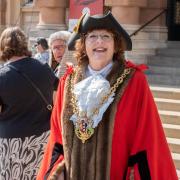During World War II thousands of PoWs were put to work on Suffolk's fields and farms. Many formed strong friendships with the locals, some even spent Christmas with them. Sophie Jackson looks back at a little-remembered part of the county's history
During World War II thousands of PoWs, especially Italians and Germans, were put to work on Suffolk’s fields and farms. Many formed strong friendships with the local people and some even spent Christmas with them. Sophie Jackson looks back at a little-remembered part of the county’s history
It was a chance conversation that sparked the idea for Churchill’s Unexpected Guests. A family friend was describing his memories of the war and among them was one of watching German sailors being marched through Lowestoft harbour blindfold.Who were these Germans? Where did they go? In that instant an epic search began to uncover the stories of these men, but there were to be many hurdles ahead; lost records, forgotten stories and above all trying to track down the people who were there and who were now fast disappearing.
We had POWs?For those who lived through the war or just after, it may seem bizarre that most generations since are almost entirely ignorant that Britain held around 350,000 enemy prisoners during the war. While much has been written and broadcast about German and Japanese POW camps, our home-grown camps are a mystery to many people.This is not surprising, as most traces of our former prisoners have been erased. The camps, only temporary anyway, have long since been removed, some have been built over. Records of the POWs themselves were either destroyed or sent to the prisoners’ home countries after the war. Books on the subject are few and far between, most written just after the war or of an academic nature, dealing with facts and figures rather than the lives of these men. Within 60 years, the majority of traces of our former prisoners have simply vanished. Talk to people today and when you mention there used to be prison camps in Suffolk their eyes open wide and they look astonished. With this lack of knowledge, researching the topic of POWs in Britain was not going to be easy.
Start at the topAn initial search through the archives of the local record office in Lowestoft revealed some interesting information about POWs. Suffolk and Norfolk had several camps, some associated with airfields. There were camps at Diss, Mildenhall, Ellough Airfield (Beccles), Flixton Airfield (Bungay), and Debach Airfield (Woodbridge). There were also numerous temporary camps, often associated with farms, but unrecorded in official documents.
The prisoners were often seen wandering around villages and towns, identifiable by their uniform often with a big ‘P’ sewn on it.
Most of these camps held Italians, though some of the inland camps later changed to Germans. Authorities were reluctant to site Nazi POWs around Suffolk in case prisoners gathered information on military targets and then escaped back to Germany. Hence the reason German captives were marched through Lowestoft blindfold. It was a prime military target with Sparrow’s Nest renamed HMS Europa and used by the Royal Naval Patrol Service with sailors housed in local properties. It was better that no German ever caught a glimpse of the town.Italians, however, were a lesser concern and most were quite relieved to be out of the war. When the harvest of 1943 came around and there was a shortage of labour, the government decided to use volunteers from among the Italian POWs to fill the gap. Not everyone was pleased with this idea; some considered the Italians lazy and prone to stealing.At a Newmarket Urban District Council meeting Mr Somerset de Chair, member for South-West Norfolk declared;“Those Fascists who boasted that they would march through the streets of Cairo are strolling about the streets of Swaffham, to the annoyance of the inhabitants.” Lord Somerleyton was equally critical of the Italians’ laziness. At a meeting of Suffolk County Agricultural Committee he remarked: “The matter is a scandal in our district. Can’t you stop the food of those who don’t work? No work, no food – that is reasonable. They are having it all their own way.”But despite complaints there was no real choice. The labour shortage could not be resolved without employing POWs. It was not until after D-Day that German prisoners began to replace the Italian workforce. They proved much more popular with farmers. One German prisoner spoke about a gentleman from London sent by one of the ministries to report on the new workforce and who “acknowledged that we were ‘very good workers’. Later everyone heard it said that we worked 60 per cent better than our predecessors, the Italians.”
At home with the enemyDespite the problems, many people quickly settled into life with POWs and some grew quite fond of them. My own grandmother recalls taking tea on her back lawn as a child with Italian prisoners working on the nearby farm. Other locals visited farms where the men worked and bought wooden toys from them. The prisoners were often seen wandering around villages and towns, identifiable by their uniform often with a big ‘P’ sewn on it.In 1946 the government lessened restrictions on prisoners associating with the general public. Until then it had been technically illegal to speak and visit a POW, though that did little to stop people. By the end of the war, many people had warmed to their unexpected guests and even felt sympathy for them.When Christmas 1946 came around, people were asked to consider inviting a German into their homes for the celebrations. This was initially a Quaker scheme and a number of Quakers in Norwich took up the suggestion and had a German to Christmas dinner, but non-Quakers were just as keen to invite one of their new friends around.The government issued special guidelines for the occasion, including how a POW should be invited, what time he could leave the camp and when he needed to be back, also specifying that the prisoner’s hosts were responsible for ensuring he didn’t abscond during his visit.Many POWs were grateful to receive an invite and spend Christmas in a family environment, something some had not done since the start of the war.
Despite the war, POWs in Suffolk, and in Britain as a whole, were treated fairly and kindly. Fond memories and friendships were formed. Considering this, it is a shame that they are almost forgotten in our modern era. Our unexpected guests have left little mark on our landscape of their existence other than in the recollections of those who knew them.


























